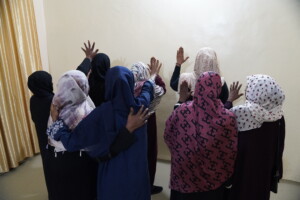Farmers in Sudan report 80% cotton crop failure
The El Gezira and El Managil Farmers Alliance reported that 80 per cent of this year’s cotton production has failed due to exposure to pests.
 Traditional cotton harvest in El Gezira (File photo: sudanvisondaily)
Traditional cotton harvest in El Gezira (File photo: sudanvisondaily)
The El Gezira and El Managil Farmers Alliance reported that 80 per cent of this year’s cotton production has failed due to exposure to pests.
Jad El Radi, member of the Farmers Alliance Secretariat, said in a press conference in Khartoum today after the conclusion of the seventh Land Conference organised by the Alliance, that they decided to demand that the government assume responsibility for providing agricultural inputs. He highlighted that banks currently impose interest on loans to farmers that exceeds 40 per cent.
The farmers also demand the immediate suspension of the contractual employment systems, the reinstatement of all people dismissed for participation in protests. They call for the establishment of a competent technical committee to determine the ownership of the land of the El Gezira and El Managil Agricultural Scheme, provided that the Sudanese state alone is the owner and leaseholder of the land, not the United Capital Bank.
The Farmers Alliance further called for an improvement in the living conditions of seasonal labourers and small farmers (called kanabi, ‘camp workers’ in Sudan) in the area.
El Radi also urged for an investigation into the situation of agricultural companies and their role in the El Gezira and El Managil Scheme, a review of the ownerships and ways they are financed, and “a review of the corruption that accompanied their formation”, pointing out that these companies received SDG 330 billion in financial support from the government led by ousted President Omar Al Bashir.
He called for the formation of a legal committee to review the property of farmers affiliated with these companies and their shares in financial institutions and banks.

Seasonal labourers
In April 2018, a large police force reportedly using excessive force and tear gas, destroyed large parts of Kombo Aftas, a village in Hasahisa locality inhabited by seasonal labourers and small farmers.
At the time, Jaafar Mohamed, secretary-general of the Kanabi Association, described the incident to Radio Dabanga as “a clear indicator of corruption in the land sector”, and pointed to previously attempts by the authorities to demolish other villages in the area.
In May 2018, the Ministry of Agriculture of the previous regime announced that the state sold railway lines in El Gezira agricultural scheme, and settled the issue by giving houses to 2,500 affected workers in Sudan’s largest agricultural project.
In July, the Sudanese security service prevented a press conference organised by the El Gezira and El Managil Farmers Alliance in Omdurman. The farmers wanted to announce plans to take their case to court.
Security agents blocked the entrance of the building, the headquarters of the National Umma Party, to prevent people from entering. At the time, Mohamed El Jak Abushama, leading member of the Farmers Alliance, told Radio Dabanga: “The aim of the press conference is to inform people that the Sudanese government has committed deliberate damage to the agricultural scheme, with their aim to sell it.”
Radio Dabanga’s editorial independence means that we can continue to provide factual updates about political developments to Sudanese and international actors, educate people about how to avoid outbreaks of infectious diseases, and provide a window to the world for those in all corners of Sudan. Support Radio Dabanga for as little as €2.50, the equivalent of a cup of coffee.












 and then
and then